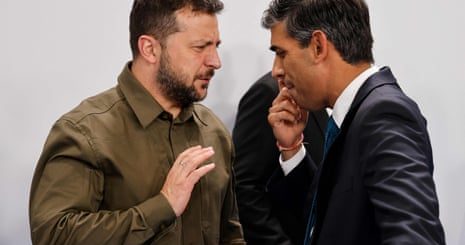Post Office only agreed to accept reduced charges in some cases if accused accepted ‘nothing wrong’ with Horizon – UK politics live | Politics
Post Office only agreed to accept reduced charges in some cases if accused accepted ‘nothing wrong’ with Horizon, inquiry told
Back at the Post Office Horizon IT inquiry, Julian Blake, counsel for the inquiry, asks about another prosecution of a post officer operator. He shows the inquiry a document showing the Post Office indicated that it would accept a guilty plea on a less serious charge provided the defendant agreed to accept that there was “nothing wrong with Horizon”.
Blake asks if this was acceptable.
Stephen Bradshaw, the Post Office investigator giving evidence, at first avoids the question, saying this may reflect what had been said earlier.
Sir Wyn Williams, the chair, says it’s a simple question. Was it appropriate?
Bradshaw replies: “Probably not.”
When Blake presses Bradshaw on this, he appears to retract at a little. It would not be acceptable “with today’s knowledge”, Bradshaw says.
Q: What about the knowledge you had then?
Bradshaw says that is the way cases happened then. The instructions came from solicitors.
Blake says there is evidence of this approach in two cases. Whose idea was it?
Not mine, says Bradshaw.
Q: Was this coming from the Post Office?
Bradshaw says the lawyers took the key decisions. He says those decisions were made “at a higher level than me”.
Key events

Post Office used threats of theft charges as ‘nasty crowbar’ to get people to plead guilty to false accounting, KC claims at inquiry
Back at the Post Office Horizon IT inquiry, Stephen Bradshaw, the former Post Office investigator, is now being questioned by counsel for core participants.
Edward Henry KC, who is representing some sub-post office operatives, put it to Bradshaw that people were accused of theft, even when there was no evidence for that, as a tactic to get them to plead guilty to false accounting. He said the Post Office was using theft as “a nasty jemmy or crowbar to leverage pleas to false accounting”.
Bradshaw said those were matters for the lawyers.
Sadiq Khan calls for ‘honest’ debate about Brexit, publishing research saying it has made UK economy £140bn smaller
Sadiq Khan, the Labour mayor of London, will call for an “honest” debate about Brexit in a speech tonight in which he will highlight new research claiming the average Briton was nearly £2,000 worse off last year because the UK is no longer in the EU.
And Khan will say that the report from Cambridge Econometrics shows the average Londoner is nearly £3,400 worse off.
The report argues that the UK economy is £140bn smaller than it otherwise would have been, and London’s economy £30bn smaller than it would have been, because of Brexit.
Khan will set out his case in his speech to the Mansion House dinner tonight. In s, Khan says:
Rather than dodging and ducking this issue, it’s incumbent on all of us to have an honest and mature discussion about the best way forward. It’s now obvious that Brexit isn’t working.
The hard-line version of Brexit we’ve ended up with is dragging our economy down and pushing up the cost of living. It’s making food more expensive, adding to the acute pressures on households and having an ongoing detrimental impact on industries that are crucial to our success – such as hospitality, construction and financial services.
I’d rather not be talking about Brexit again. But part of being the mayor of London is about standing up for our city. We’ve got to be frank – Brexit is simply not a peripheral concern that we can leave in the past – it’s a key contributor to the cost-of-living crisis right now and it’s resulting in lost opportunities, lost business and lost income at a time when people and companies can least afford it.
Khan says he agrees with David Lammy, the shadow foreign secretary, who has said that Labour wants a closer relationship with the EU. But his call for an “honest and mature” discussion about Brexit is unlikely to be welcomed by Kair Starmer, who wants more leave voters to support Labour and who says little in public about Brexit, which he is treating as a settled issue.
The Cambridge Econometrics report is an update of an analysis carried out previously. It has calculated the cost of Brexit by modelling what is likely to happen to the economy as it is now against what might have happened if the UK had stayed in the EU (the counterfactual). Here is the key table.
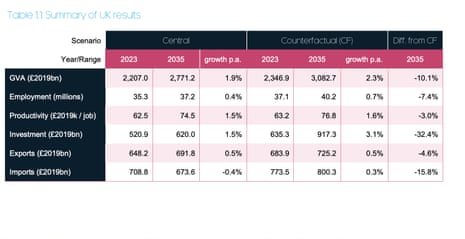
Post Office only agreed to accept reduced charges in some cases if accused accepted ‘nothing wrong’ with Horizon, inquiry told
Back at the Post Office Horizon IT inquiry, Julian Blake, counsel for the inquiry, asks about another prosecution of a post officer operator. He shows the inquiry a document showing the Post Office indicated that it would accept a guilty plea on a less serious charge provided the defendant agreed to accept that there was “nothing wrong with Horizon”.
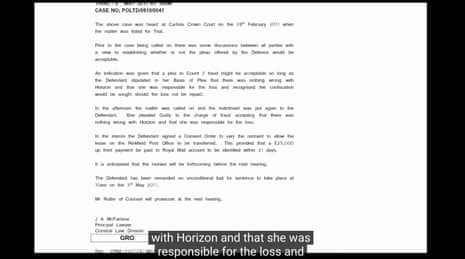
Blake asks if this was acceptable.
Stephen Bradshaw, the Post Office investigator giving evidence, at first avoids the question, saying this may reflect what had been said earlier.
Sir Wyn Williams, the chair, says it’s a simple question. Was it appropriate?
Bradshaw replies: “Probably not.”
When Blake presses Bradshaw on this, he appears to retract at a little. It would not be acceptable “with today’s knowledge”, Bradshaw says.
Q: What about the knowledge you had then?
Bradshaw says that is the way cases happened then. The instructions came from solicitors.
Blake says there is evidence of this approach in two cases. Whose idea was it?
Not mine, says Bradshaw.
Q: Was this coming from the Post Office?
Bradshaw says the lawyers took the key decisions. He says those decisions were made “at a higher level than me”.
Yousaf says Scotland will ‘in essence replicate’ England’s ban on having XL bully dogs without licence
Humza Yousaf has said the Scottish government will “in essence replicate” UK legislation banning XL bully dogs without a licence, PA Media reports. Speaking in the Scottish parliament the first minister said:
In England and Wales strict rules on the dogs came into force at the start of the month and Yousaf told MSPs:
What has become clear, I’m afraid in the last few weeks, is we have seen a flow of XL bully dogs coming to Scotland, a number of people coming to Scotland to bring XL bully dogs here to the country.
As such, we will give further details to members of the Scottish Parliament through a parliamentary statement if the parliamentary bureau agrees next week.
We will, in essence, replicate the legislation that is in England and Wales here in Scotland because ultimately, although we do have a very good system of dog control notice schemes … we have to respond to the situation as it currently stands and therefore we will do what we need to do to ensure public safety.
Yousaf stressed that he was not proposing a complete ban.
Bradshaw declines to express regret about Horizon reliability evidence being withheld from defence in false accounting case
Back at the Post Office Horizon IT inquiry, Stephen Bradshaw, a Post Office investigator, is now being asked about a case involving Angela Sefton and Anne Nield. They were convicted of false accounting in 2013 but cleared a decade later. Bradshaw was the investigator.
Julian Blake, counsel for the inquiry, asks about a description of the women facing investigators at the post offfice. It says there were tears.
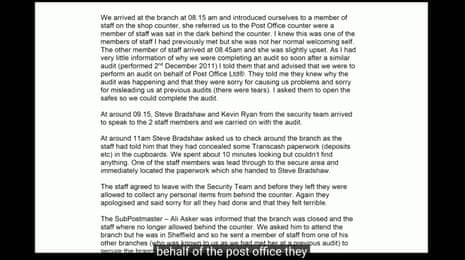
Bradshaw says he does not remember there being tears. He says the women “didn’t seem particularly upset”.
He claims his inquiry in this case was about money not being deposited. He argues that this was not a Horizon problem.
Blake puts it to him that problems with the Horizon system were the underlying cause of what went wrong. Bradshaw disputes this.
Blake reads extracts from the defence’s case in Sefton’s trial. These show that the defence did make problems with Horizon an issue.
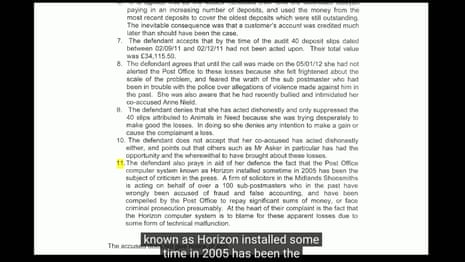
He also shows an extract from the defence statement in Neild’s case, and he says both show that problems with the Horizon were central to their defence. He says these claims show why evidence relating to the unreliability of Horizon should have been disclosed in the case.
Bradshaw continues to insist that the case wasn’t mainly about Horizon. It was about deposits not being credited with an account. Horizon was a “secondary issue”, he says.
He also argues that what was relevant was ultimately a matter for the lawyers. He was there to gather evidence, he says.
Blake shows a letter showing the Post Office’s lawyers decided not to disclose material relating to concerns about Horizon.
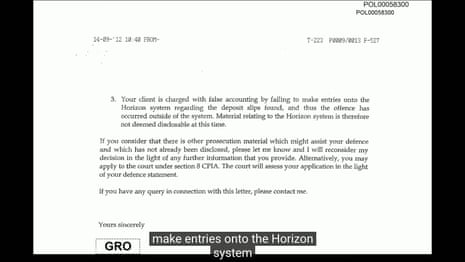
Asked if he agreed with this, Bradshaw says it was not a matter for him. He says he thought you should disclose what you have, but it was a matter for the lawyers.
Q: But you are the prosecuting authority?
Bradshaw says he was not the prosecuting authority. He says he gathered information and handed it to the lawyers.
Q: Do you have any further reflections on this?
Bradshaw says this case was primarily about the suppression of cash deposit slips.
Q: So we can take it you have no further reflections on this?
Bradshaw replies: “If you wish to take it that way, yes.”
Wes Streeting, the shadow health secretary, has issued a statement about the hospital waiting figures focusing in particular on the increase in the number of people waiting more than 18 months. (See 10.51am.) He said:
It’s deeply concerning to see rising numbers of patients waiting more than 18 months for treatment. Rishi Sunak promised to eliminate the longest waits by last summer, yet more and more patients are having to put their lives on hold for unacceptable lengths of time.
The last Labour government cut waiting lists from 18 months to 18 weeks. We did it before and we will do it again.
Labour MP Tony Lloyd says he is ill with ‘aggressive and untreatable leukaemia’
The Labour MP Tony Lloyd has released a statement saying he is ill with an aggressive and untreatable form of leukaemia. He says:
I have been receiving treatment for some time for a form of blood cancer which has been controlled by chemotherapy. Unfortunately this has now transformed into an aggressive and untreatable form of leukaemia and I will be leaving hospital today to spend the time I have left with my family.
He has asked for privacy.
Lloyd, 73, was first elected to parliament in 1983. He was a Foreign Office minister for two years under Tony Blair and left the Commons to serve as Greater Manchester’s police commissioner in 2012. In 2017 he returned to the Commons as MP for Rochdale.
No 10 says NHS waiting lists still ‘far too high’ but strikes having ‘significant impact’
At the Downing Street lobby briefing this morning the PM’s spokesperson said waiting lists were “still far too high” but argued that strikes were partly responsible. The spokesperson said:
Undoubtedly the strikes are having a significant impact on patient care, it forces those staff – the majority of staff who are not striking – to have to cover for junior doctors and that has a knock-on effect on patients.
We have seen that with the number of cancelled operations. It’s unacceptable, it’s not fair to patients, it’s not fair to other NHS workers – the majority of whom are paid less than the average junior doctor.
Humza Yousaf says he wants to work with UK government to ensure victims of Post Office Horizon scandal exonerated

Libby Brooks
At first minister’s questions in Edinburgh opposition leaders raised questions about the role of the Crown Office in the Horizon scandal, given that in Scotland, unlike elsewhere in the UK, the Crown Office and Procurator Fiscal Service (COPFS) had sole responsibility for prosecuting Horizon cases.
The Scottish Tory leader, Douglas Ross, called for the lord advocate to make a statement to MSPs after the BBC revealed that the Crown Office was first informed of possible issues with Horizon in May 2013.
Humza Yousaf, the first minister, responded that he had been told the Crown Office at that point provided guidance to courts to treat cases on evidence that did not rely on Horizon, meaning that after that the Crown Office would not prosecute solely on Horizon evidence.
Yousaf also re-iterated his pledge that everyone convicted in Scotland as part of the scandal would be cleared.
He wrote to Rishi Sunak yesterday evening, saying that he wanted to work with the UK government to ensure victims across the UK were exonerated.
Usually a law such as the one proposed by Sunak to quash the convictions would not have effect in Scotland, but Yousaf has indicated that a legislative consent motion approved in the Scottish parliament would be the quickest way of ensuring that it did apply north of the border.
He said that the process was “complex” but that his government would work “urgently” to ensure sub-postmasters did not have to wait for a moment longer for justice.

Back at the inquiry Stephen Bradshaw is now being asked about the prosecution of Khayyam Ishaq, a post office operator. Julian Blake, counsel for the inquiry, asks Bradshaw about the prosecution case. It included the prosection asserting that there was “no fault in the (Horizon) system at all”.

Asked if he was happy about that claim, Bradshaw says that that was the claim being stated by the lawyers.
Blake puts it to him that this was 2013, and that at this point Bradshaw was aware of allegations about problems with the Horizon system.
Bradshaw says he was not in court for the prosecution’s opening statement because he was a witness.
The hearing breaks for lunch.
NHS England waiting list higher than at time Sunak made pledge to reduce it, figures show
The NHS England waiting list is still higher than it was at the time Rishi Sunak pledged to reduce it, data shows, PA Media reports. PA says:
In January 2023, the prime minister made cutting the waiting list a key priority for the year, saying: “NHS waiting lists will fall and people will get the care they need more quickly”.
However the figures show that despite recent dips in the waiting list, it is still higher than when the pledge was made.
The waiting list stood at 7.21m treatments waiting to be carried out in January 2023.
As of November, some 7.61 treatments were waiting to be carried out.
The analysis shows there would need to be a drop of 400,000 in the December 2023 data (not yet published) to return the waiting list to what it was when the pledge was made.
This is four times the drop of 100,000 between October and November.
Bradshaw says he’s ‘small cog’ as he suggests lawyers to blame for evidence about Horizon flaws not being disclosed
Back at the Post Office Horizon IT inquiry, Stephen Bradshaw, the Post Office investigator, is being asked about a trial where the defence asked for the disclosure of evidence about wider problems with the Horizon system. Julian Blake, counsel for the inquiry, highlights various documents showing that Bradshaw was asked for information but gave little or nothing in response. Bradshaw repeatedly says that he relied on the Post Office’s lawyers to decide what should be disclosed. “I’m a small cog in this,” he says.
Asked if he ever had concerns when he realised the lawyers were refusing to hand over more documentation about wider problems with the Horizon system, Bradshaw says he cannot remember what was said.
But he repeats the point about how he viewed this as an issue for the lawyers, even though he was the disclosure officer in the case.
Waiting list figures show Sunak can’t claim blame strikes for hospital performance, says RCN
The Royal College of Nursing says today’s hospital waiting figures (see 9.48am) show the PM cannot just blame NHS strikes for long waiting lists. In a statement Pat Cullen, the RCN general secretary, said:
The NHS waiting list remains extraordinarily high and the UK government only has itself to blame. It’s been over a year since the prime minister pledged to bring down the waiting list, yet it remains 400,000 higher than when he made his promise.
The prime minister can’t pull the wool over people’s eyes by claiming it is down to strike action. He needs to start listening to nursing staff who have been calling for investment in the workforce, including fair pay.
Under the government’s Post Office Horizon plan announced yesterday, as well as legislation to quash wrongful convictions, there will also be a new compensation offer of £75,000. This is for members of the “group litigation cohort”, post office operators who were not convicted but who were wrongly forced to “hand back” money that the Horizon IT system was missing. This group has been instrumental in exposing the miscarriage of justice.
Members of this group can either accept £75,000 upfront or, if they believe they are entitled to more, seek specific compensation under a process already in place.
At the Downing Street lobby briefing this morning the PM’s spokesperson said the government expected most people in this group would not accept the upfront payments. He said:
It’s worth emphasising that this is an upfront offer. We would estimate that around a third of individuals would take that.
For those that are more significantly impacted, perhaps they had to use significantly more of their life savings or whatever it might be, they are able to seek a higher offer. And our aim is to resolve that by the summer.
We recognise that there will be a significant number for whom £75,000 is not sufficient. That’s entirely understandable.
The spokesperson also did not rule out further legislation once the inquiry is over.
Labour has posted a summary of its child health action plan on its website. Keir Starmer and Wes Streeting have been formally launching it in Liverpool this morning.

Back at the Post Office Horizon IT inquiry Stephen Bradshaw is being asked about what he did to establish that the computer system was working properly.
Julian Blake, counsel for the inquiry, shows an extract from a report by Bradshaw into a particular inquiry where Bradshaw said he was not aware of any problems with Horizon’s “product integrity”.
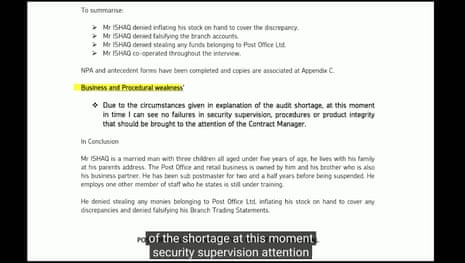
And Blake brings up this extract from Bradshaw’s witness statement, where he implies it was not for him to question the integrity of the Horizon system.
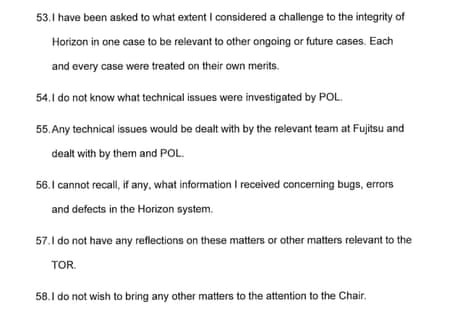
Blake questions why Bradshaw was not more sceptical of Horizon, given that by this point doubts about the system were being raised.
Bradshaw says in the investigation referred to, Horizon was not the issue.
In the Commons this morning Penny Mordaunt, leader of the house, told MPs that the second reading of the government’s oil and gas bill would take place on Monday 22 January. It was meant to happen three days ago, but got postponed because other business overran.

